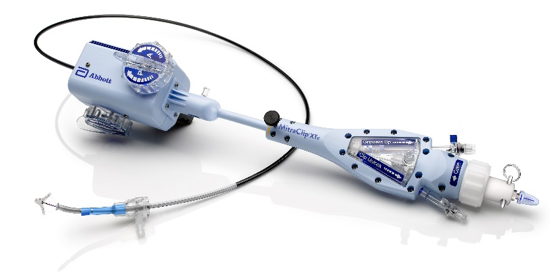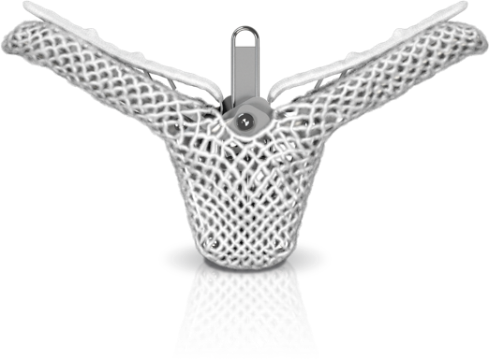Frequently Asked Questions
The following FAQ is an overview of our most frequently asked questions.
What is the Valve made out of?
 A steerable guide catheter introduces a small metal clip covered with a polyester fabric into the body. There are two sizes of clips available. Depending on your anatomy, the physician will determine which clip would best be suited for your heart. Both clips are smaller than the size of a dime.
A steerable guide catheter introduces a small metal clip covered with a polyester fabric into the body. There are two sizes of clips available. Depending on your anatomy, the physician will determine which clip would best be suited for your heart. Both clips are smaller than the size of a dime.
Will I feel the device in my heart?
No, you will not feel the device.
How does it stay in the body?
 The device clips together either side of the mitral valve. Your valve continues to open on either side of the clip, allowing blood to flow while reducing the backflow of blood in the wrong direction.
The device clips together either side of the mitral valve. Your valve continues to open on either side of the clip, allowing blood to flow while reducing the backflow of blood in the wrong direction.
How long does the device last?
Because this technology is new, the longevity of the device has not yet been determined. MitraClip therapy has in use since 2003 and laboratory testing supports durability of the device over a 15 year period.
Is it safe to have an X-ray, MRI or other imaging?
X-rays and MRIs are generally safe. It is important to tell any health care provider that you’ve undergone a TMVR procedure before any CT or MRI study.
What type of anesthesia will be used?
The procedure is done under general anesthesia. You will not feel pain during the procedure. An anesthesiologist will be monitoring your body’s vital functions and breathing throughout the entire process. Once you are asleep, the physician will insert a tube into your mouth and down your windpipe to ensure adequate oxygenation. Most patients will be woken up in the procedural room and the breathing tube will be removed at that time.
Does Eisenhower Health have a lot of experience with this procedure?
Yes, Eisenhower Health has been performing this procedure since 2018.
How often do I need follow up care after the procedure?
You should have a follow up appointment arranged a week from your procedure with the cardiologist from the Heart Valve team at Eisenhower. Within 30 days of your procedure you should have an echocardiogram, then yearly after that with your primary cardiologist. You may need additional follow up depending on your own medical needs.
Whom do I notify for emergencies once I am discharged?
If you are experiencing a true medical emergency, you should call 911.
For any other valve related questions, you may call Eisenhower Health’s Tamkin Cardiac Wellness Program or the office of the physician who implanted your new valve.
Can a loved one stay with me in the hospital?
Patients stay at least one night on the telemetry unit and are evaluated for discharge the morning after surgery (post-op day one).
Visitors are welcome 24 hours a day according to your preference. Visiting is individualized by nurses according to patients’ needs. Patients may otherwise designate and receive visitors of their choosing. Children supervised by an adult are welcome and are not restricted by age.
How long will the procedure take?
Although the delivery of the clip can take from one to three hours, it could take longer depending on the complexity of the case and number of clips to be inserted. You will be in the procedure room for three or more hours as there is a lot of preparation that takes place before delivery of the clip(s) and procedural work afterwards.
Will I need to go to a rehab facility or have a visiting nurse?
If you had home health services prior to the procedure, it will be likely you will need them after the procedure. If you didn’t have these services prior to the procedure prior to the procedure, it will be unlikely you will need them. However, a member of our team will see you daily while you are in the hospital and will ensure you have a safe transition out of the hospital.
We highly encourage you to participate in outpatient cardiovascular rehabilitation. This program will safely assist you in increasing your physical activity and assist with risk reduction, medication and nutrition education. Your Heart Valve Team physician will refer you to a cardiac rehab clinic on your post-operative office visit.
How soon will I start to feel better?
Some people notice an immediate difference and some do not notice a difference for several weeks. There are things you can do to improve your recovery such as participating in cardiac rehabilitation. We encourage walking regularly.
What kind of support will I need at home after the procedure?
It is advised that you have someone who can look in on you or be around you for the first 48 hours after discharge. Also, since driving and lifting is not allowed for one week following the procedure, you should ensure that you have access to food and someone available to help with household chores.
How do I care for my incisions?
Check your procedure site daily. You may see bruising which is normal. Monitor any drainage, bleeding, redness or odor. Do not submerge incision sites in water, such as a bathtub, swimming pool or hot tub. Showering is allowed. Wash with warm water and soap. Gently pat incisions dry. These sites should be kept clean and dry without ointments or powders.
It is normal for your groin incisions to be itchy or sore while healing. Your incisions may take a week or more to heal. You may remove or replace bandages if needed. This area may also be left open to air if there is no drainage. Your Heart Team physician will evaluate sites on your post-operative visit.
Will I need to take antibiotics before going to the dentist?
The American Heart Association (AHA) recommends lifelong use of antibiotics prior to any dental procedure (including cleaning) following heart valve replacement.




